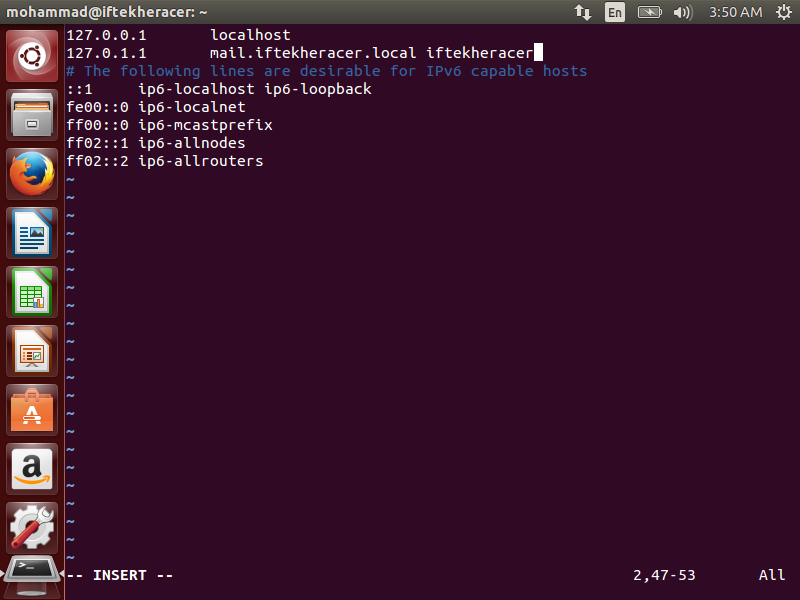Apt Get Install Qmail
Apr 15, 2015 sudo apt-get update sudo apt-get -y install qmail sudo qmailctl start. Ryan (Post author) August 26, 2019 at 12:13 pm Hi Adam. At the time of this writing, installing the default Qmail package on Ubuntu 18.04 does not automatically install at least one necessary dependency to make Qmail work. Let’s manually install that package: sudo apt-get install daemontools-run. To install Qmail, run the following: sudo apt-get install qmail. Let’s create a Maildir directory.
Run the following command (As non-root user) tar zxf cd (Now read the INSTALL file and follow the steps to install Qmail) -Example- (As non-root user) tar zxf release-18.tar.gz cd release-1.03 vi INSTALL (Read and follow steps) 2.4.

Introduction
Ubuntu Apt Get

Qmail is a secure, reliable, efficient, simple message transfer agent. It is designed for typical Internet-connected UNIX hosts. As of October 2001, qmail is the second most common SMTP server on the Internet, and has by far the fastest growth of any SMTP server.
Installation
This guide will help you easily set up a email server using Qmail as MTA, OpenLDAP as a back-end for users, and Courier IMAP for IMAP server. Follow These simple steps..
Qmail
In this setup I assume that your domain is yourdomain.com and it has a valid MX record setup as mail.yourdomain.com. Remember to replace yourdomain.com with your actual domain in the example codes in this howto. Also I assume that you know what an MX record is. To find out MX your type in a terminal:
Note: I will use root login from here
Prerequisite packages for Qmail
Creating users and groups..

Qmail Complile
Apt Get Install Mail
Qmail Configure and ldap control files
UCSPI-TCP / Daemontools Install
Qmail Run Script Files
Note: 192.168. is my local ip range to know more about options used go to www.nrg4u.com
OpenLDAP
LDAP means Lightweight Directory Access Protocol, a simplified version of X500 protocol. You will find a more detailed presentation on Wikipedia. LDAP is a way to make certain kinds of information available across a network. In this setup the information is user logins - their passwords, user IDs, and various details.
First, install the ldap server daemon (slapd) on the server: install the following packages: slapd, ldap-utils, and db4.2-util.
Now Create a tmp configuration file
Remember to change the rootpw by genrating new password hash use the command slappasswd
Now let's populate some database
Courier IMAP
Webmail
To configure webmail go to Roundcube Mail to setup latest version ...
I make it a goal to do as little custom configuration work as possible. No building from source, no third-party package repositories, and restricting myself to use a core, stable subset of system features when building software. Performing a package or OS upgrade only to find that some bleeding edge feature you were using has changed is frustrating at best, a lurking security hole at worst.
As a result, my preference for Qmail as a MTA may seem odd, given that Qmail is perceived as challenging to configure. However, when it comes to secure, set-and-forget software, Qmail is just about as good as it gets. It’s the Fort Knox of MTAs: highly efficient and designed to be secure. While it may appear a bit difficult to get started, once you understand the way Qmail approaches mail delivery, you’ll never go back to any of the otherbuggyMTAs.

But for those of us that use Ubuntu, there’s a problem. The Ubuntu package for Qmail, though stable, is somewhat outdated. It lacks several important patches such as the CNAME patch, which simply makes DNS lookups more efficient. Why is this important? Because if you don’t apply this patch, sites with large DNS records will trigger temporary failures (“CNAME lookup failed temporarily”) until Qmail finally gives up and bounces the outgoing message. There are workarounds (editing the smtproutes configuration, in this case), but they’re tedious and require ongoing oversight.
The list of useful Qmail patches is fortunately rather short, but would require a custom build of Qmail, which in my case is unworkable. I use Puppet to configure all of my servers, so handling custom package builds becomes a more serious challenge, not to mention requiring the entire suite of build tools on the server.
With a just-in-time custom build ruled out, the best remaining option in the Ubuntu ecosystem is to create a Personal Package Archive on Launchpad, Canonical Ltd’s third-party package repository. With a PPA, I can upload my patched Qmail source package, at which point Launchpad will build and host packages that are easily imported into the Ubuntu package manager.
In the interest of simplicity, instead of modifying the original Qmail source, I followed the package manager’s convention and applied the changes as a series of patches. Some applied cleanly, without any additional modification. Others (particularly the Qmail Authentication patch) required extensive rework to accommodate changes from the other patches.
Apt Get Install Qmail Free
In the end, I added 6 additional patches to Qmail:
- 0004 – Remove the CNAME lookup (per DJB himself: “It’s safe to simply skip the CNAME lookup: i.e., have dns_cname simply return 0”)
- 0005 – Handle large DNS responses (would also have solved the above problem – I applied both since the CNAME lookup is no longer useful and is extra work)
- 0006 – Return “Unrecognized” instead of “Unimplemented” for non-existent SMTP commands
- 0007 – Screen for and reject email addresses with relay characters
- 0008 – A host of inbound and outbound SMTP AUTH authentication patches
- 0009 – Support for external recipient validation via the RCPTCHECK environmental variable
Sudo Apt-get Install Qmail
The source is on Github and the packages are built and available via Launchpad; instructions for incorporating them into your Ubuntu install are there as well. I’ve been running the new build in production on a handful of servers and haven’t experienced any problems yet. If you find one though, send a pull request on Github and send me an email. I’ll incorporate it, rebuild, and republish the package.